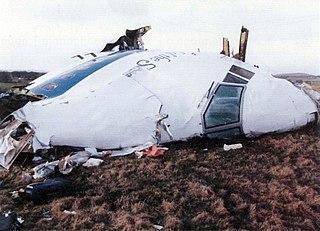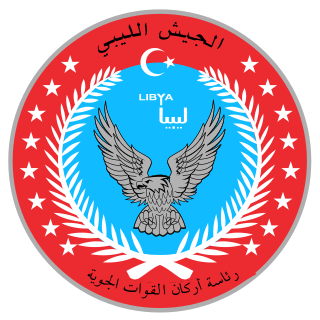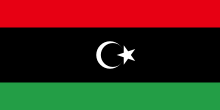
Libya, officially the State of Libya, is a country in the Maghreb region of North Africa. It borders the Mediterranean Sea to the north, Egypt to the east, Sudan to the southeast, Chad to the south, Niger to the southwest, Algeria to the west, and Tunisia to the northwest, as well as maritime borders with Greece, Italy and Malta to the north. Libya comprises three historical regions: Tripolitania, Fezzan, and Cyrenaica. With an area of almost 1.8 million km2 (700,000 sq mi), it is the fourth-largest country in Africa and the Arab world, and the 16th-largest in the world. Libya claims 32,000 square kilometres of southeastern Algeria, south of the Libyan town of Ghat. The country's official religion is Islam, with 96.6% of the Libyan population being Sunni Muslims. The official language of Libya is Arabic, with vernacular Libyan Arabic being spoken most widely. The majority of Libya's population is Arab. The largest city and capital, Tripoli, is located in northwestern Libya and contains over a million of Libya's seven million people.

Muammar Muhammad Abu Minyar al-Gaddafi was a Libyan revolutionary, politician and political theorist who ruled Libya from 1969 until his assassination by rebel forces in 2011. He came to power through a military coup, first becoming Revolutionary Chairman of the Libyan Arab Republic from 1969 to 1977 and then the 'Brotherly Leader' of the Great Socialist People's Libyan Arab Jamahiriya from 1977 to 2011. Initially ideologically committed to Arab nationalism and Nasserism, Gaddafi later ruled according to his own Third International Theory.

The Libya national football team represents Libya in men's international football and is controlled by the Libyan Football Federation. The team has never qualified for FIFA World Cup but has qualified for editions of the Africa Cup of Nations in 1982, 2006, and 2012. In 1982, the team was both the host and runner-up. In the Arab Cup, Libya finished second in 1964 and 2012, and third in 1966. The team is affiliated with both FIFA and Confederation of African Football (CAF).

Saif al-Islam Muammar al-Gaddafi is a Libyan political figure. He is the second son of the late Libyan dictator Muammar Gaddafi and his second wife Safia Farkash. He was a part of his father's inner circle, performing public relations and diplomatic roles on his behalf. He publicly turned down his father's offer of the country's second highest post and held no official government position. According to United States Department of State officials in Tripoli, during his father's reign, he was the second most widely recognized person in Libya, being at times the de facto prime minister, and was mentioned as a possible successor, though he rejected this. An arrest warrant was issued for him on 27 June 2011 by the International Criminal Court (ICC) for charges of crimes against humanity against the Libyan people, for killing and persecuting civilians, under Articles 7(1)(a) and 7(1)(h) of the Rome statute. He denied the charges.

On 7 July 2012, the National Transitional Council, in power since the Libyan Civil War, supervised democratic elections for a 200-member General National Congress to replace the Council. The assembly was to choose a prime minister and organize parliamentary elections in 2013. A process to write a constitution was also to be determined. Unrest driven by armed militias, ethnic minority and radical groups undermined the process and the government for the years following the overthrowing of Muammar Gaddafi. While internal apathy towards democratic reforms slowed the process, external bodies such as the European Union were still pressing for the establishment of a national dialogue to build consensus for the drafting of a new constitution to take place before the end of 2014. Parliamentary elections were scheduled to be held on 25 June 2014 in a move aimed at stabilizing the country and quelling the unrest.

Pan Am Flight 103 (PA103/PAA103) was a regularly scheduled Pan Am transatlantic flight from Frankfurt to Detroit via a stopover in London and another in New York City. Shortly after 19:00 on 21 December 1988, while the Boeing 747 "Clipper Maid of the Seas" was in flight over the Scottish town of Lockerbie, it was destroyed by a bomb, killing all 243 passengers and 16 crew aboard. Large sections of the aircraft crashed in a residential street in Lockerbie, killing 11 residents. With a total of 270 fatalities, the event, which became known as the Lockerbie bombing, is the deadliest terrorist attack in the history of the United Kingdom.

The Egyptian–Libyan War, also known as the Four Day War, was a short border war fought between Libya and Egypt that lasted from 21 to 24 July 1977. The conflict stemmed from a deterioration in relations that had occurred between the two states after Egyptian President Anwar Sadat had rebuffed Libyan leader Muammar Gaddafi's entreaties to unify their countries and had pursued a peace settlement with Israel in the aftermath of the Yom Kippur War in 1973. Soon thereafter Libya began sponsoring dissidents and assassination plots to undermine Sadat, and Egypt responded in kind to weaken Gaddafi. In early 1976 Gaddafi dispatched troops to the Egyptian frontier where they began clashing with border guards. Sadat responded by moving many troops to the area, while the Egyptian General Staff drew up plans for an invasion to depose Gaddafi.

The Libyan Air Force is the aerial warfare branch of the Libyan Armed Forces. In 2010, before the First Libyan Civil War, the Libyan Air Force personnel strength was estimated at 18,000, with an inventory of 374 combat-capable aircraft operating from 13 military airbases in Libya. Since the aftermath first civil war in 2011 and the outbreak of the Second Libyan Civil War, multiple factions fighting in Libya have been in possession of military aircraft. As of 2019, the Libyan Air Force is nominally under the control of the internationally recognised Government of National Accord in Tripoli, though the rival Libyan National Army of Marshal Khalifa Haftar also has a significant air force. In 2021, the air force was under command of the new President of Libya, Mohamed al-Menfi that replaced Fayez al-Sarraj.

The Libyan civil war, also known as the First Libyan Civil War, was an armed conflict in 2011 in the North African country of Libya that was fought between forces loyal to Colonel Muammar Gaddafi and rebel groups that were seeking to oust his government. The war was preceded by protests in Zawiya on 8 August 2009 and finally ignited by protests in Benghazi beginning on Tuesday 15 February 2011, which led to clashes with security forces who fired on the crowd. The protests escalated into a rebellion that spread across the country, with the forces opposing Gaddafi establishing an interim governing body, the National Transitional Council.

Field Marshal Khalifa Belqasim Omar Haftar is a Libyan politician, military officer, and the commander of the Tobruk-based Libyan National Army (LNA). In 2015, he was appointed commander of the armed forces loyal to the elected legislative body, the Libyan House of Representatives.

The Libyan National Army or the Libyan Arab Army is a component of Libya's military forces which were nominally a unified national force under the command of Field Marshal Khalifa Haftar when he was nominated to the role on 2 March 2015 by the House of Representatives, consisting at the time of a ground force, an air force and a navy.

Members of the Islamic militant group Ansar al-Sharia carried out a coordinated attack against two United States government facilities in Benghazi, Libya on September 11, 2012. At 9:40 p.m. local time, members of Ansar al-Sharia attacked the American diplomatic compound in Benghazi resulting in the deaths of both United States Ambassador to Libya J. Christopher Stevens and U.S. Foreign Service Information Management Officer Sean Smith. At around 4:00 a.m. on September 12, the group launched a mortar attack against a CIA annex approximately one mile (1.6 km) away, killing two CIA contractors Tyrone S. Woods and Glen Doherty and wounding ten others. Initial analysis by the CIA, repeated by top government officials, indicated that the attack spontaneously arose from a protest. Subsequent investigations showed that the attack was premeditated—although rioters and looters not originally part of the group may have joined in after the attacks began.

The Libyan civil war (2014–2020), also known as the Second Libyan Civil War, was a multilateral civil war which was fought in Libya among a number of armed groups, but mainly the House of Representatives (HoR) and the Government of National Accord (GNA), for six years from 2014 to 2020.

The Libyan House of Representatives is the legislature of Libya resulting from the 2014 Libyan parliamentary election, which had an 18% turnout. On 4 August 2014, in the course of the progressing August 2014 Islamist coup in the capital Tripoli in the context of the Libyan Civil War, the House of Representatives relocated itself to Tobruk in the far east of Libya. Several HoR sessions were held in Tripoli in May 2019 while Tripoli was under armed attack, electing an Interim Speaker for 45 days. Between 2014 and 2021, the House of Representatives supported the Tobruk-based government led by Abdullah al-Thani before supporting the incumbent Government of National Unity led by Abdul Hamid Dbeibeh. In September 2021, the House of Representatives passed a no-confidence motion against the interim GNU government and later appointed a rival Government of National Stability (GNS).

The Libyan crisis is the current humanitarian crisis and political-military instability occurring in Libya, beginning with the Arab Spring protests of 2011, which led to two civil wars, foreign military intervention, and the ousting and death of Muammar Gaddafi. The first civil war's aftermath and proliferation of armed groups led to violence and instability across the country, which erupted into renewed civil war in 2014. The second war lasted until October 23, 2020, when all parties agreed to a permanent ceasefire and negotiations.

The Western Libya campaign was a military campaign initiated on 4 April 2019 by the Operation Flood of Dignity of the Libyan National Army (LNA), which represents the Libyan House of Representatives, to capture the western region of Libya and eventually the capital Tripoli held by the United Nations Security Council-recognised Government of National Accord (GNA). The GNA regained control over all of Tripoli in June 2020 and the LNA forces withdrew from the capital, after fourteen months of fighting.

Libyan-Turkish relations are the foreign relations between Libya and Turkey. While this relationship cannot currently be attributed to one government in Libya, generally speaking it is a contested relationship between Turkey and the pro-Turkish Government of National Accord. Libya has a functional embassy in Ankara and a consulate-general in Istanbul, while Turkey has an embassy in Tripoli. Turkey currently occupies bases in Libya with Al-Watiya Air Base being a major airbase in the west, and Port of Misrata being most notable naval base acquired but contested during the 2020 Turkish military intervention in the Second Libyan Civil War.
Seham Sergiwa is a Libyan psychologist elected to the Libyan parliament in 2014. She was abducted by a Libyan National Army militia loyal to Khalifa Haftar on 17 July 2019. The United Nations Support Mission in Libya expressed its deep concern and stated that "silencing the voices of women in decision-making positions [would] not be tolerated." As of 17 October 2019, Sergiwa's fate and whereabouts were unknown and the "authorities in eastern Libya" had not made public the results of any investigation.
The ongoing COVID-19 pandemic was confirmed to have spread to Libya on 24 March 2020, when the first case was officially confirmed in Tripoli.















